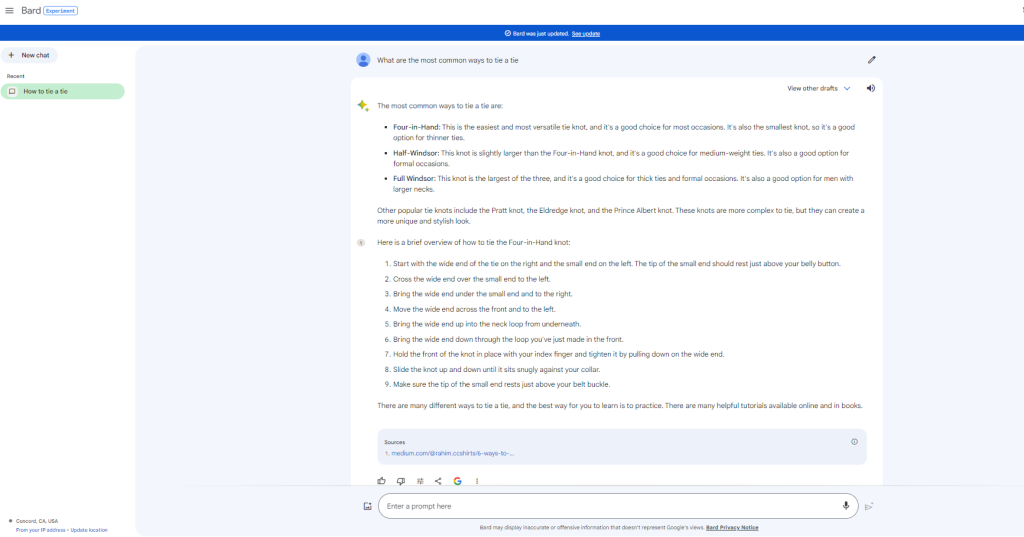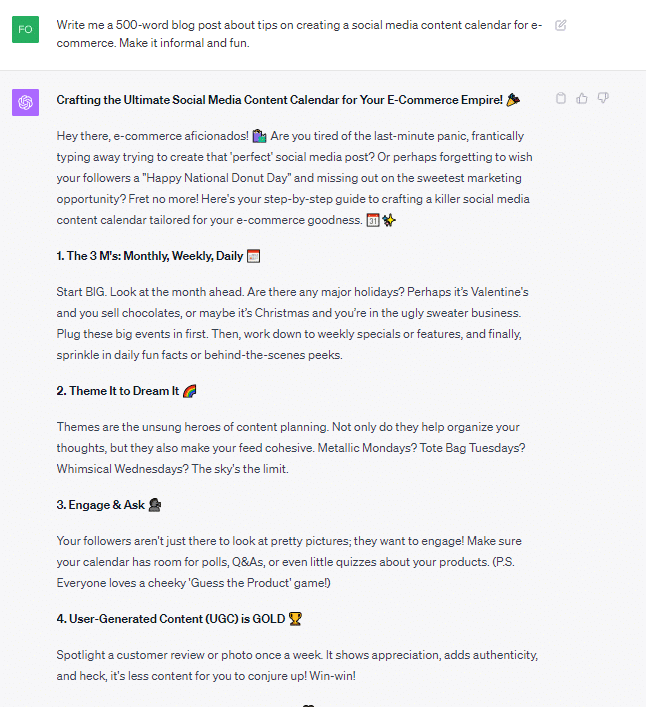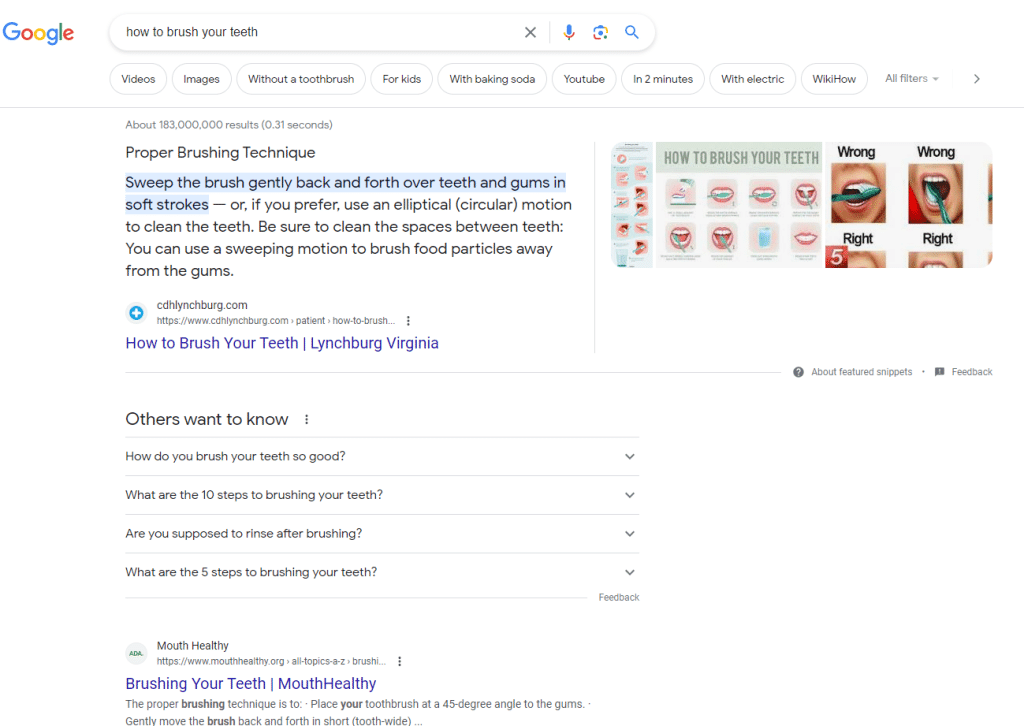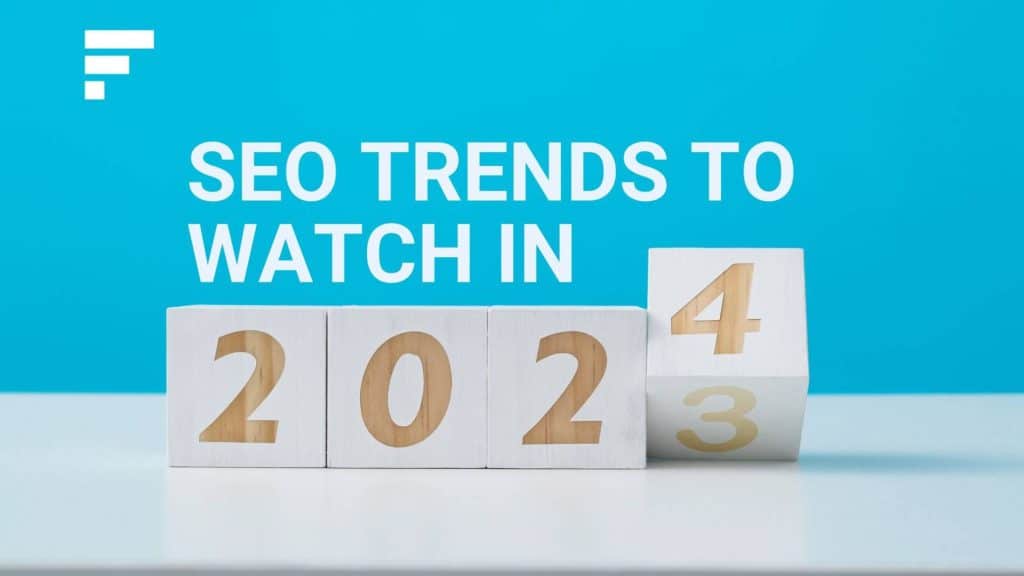In the ever-evolving world of SEO and marketing, it’s essential to stay updated with the latest trends. As we venture into 2024, we’ve rounded up 10 significant shifts set to influence the industry. Watching these can help position your business for success. Stay informed and ahead of the curve with our curated insights.
1. Artificial Intelligence
- WHAT TO KNOW: AI tools like ChatGPT have reshaped industries, including SEO. With the rise of “conversational search,” expect even bigger changes in 2024, moving away from classic keyword searches.
- WHY IT’S RELEVANT: As AI reshapes SEO, conversational search is altering user behavior, prompting major search engines like Google and Bing to adapt, further transforming the digital realm.
The rise of artificial intelligence – through tools like ChatGPT and other advanced AI tools – revolutionized the way we operate in 2023. SEO is not an exception to that, as you’ve likely adopted new processes or at least experimented with these tools since their release.
Don’t think 2024 is going to be any different. In fact – expect even more exponential advancements.
ChatGPT, along with other LLMs, now offers the experience of “conversational search.” Rather than typing keywords into a search field in Google, users now have the opportunity to “interact” with these chat tools to get specific answers in a conversational format.
While Google remains insanely popular across the world, expect to see a significant shift in the way users search on the web – and how the SEO industry, particularly Google and Bing, responds.
Search Generative Experience
So how has Google responded to the meteoric rise of ChatGPT?
First – it’s created its own tool/solution, dubbed Bard. And Bard is quickly making its way to a SERP near you.
You can see Bard in action in the Search Generative Experience. You’ll see AI-generated content within the SERP, typically placed above all search results – including Ads and organic results. You’ll also see various citations to the source materials used to create the AI-generated content with additional options to “keep the conversation going,” so to speak.

This will have a massive impact on search results if (or when) Google makes this the definitive experience for all users. An important date to keep in mind: December 31. The beta period ends on December 31, so it’ll be a milestone date to monitor to see whether (1) Google releases the Search Generative Experience to all users, and (2) what the feature will look like.
What can we, as SEOs, expect to see? One study estimates organic traffic could drop as much as 64% due to changing click-through rates brought about by the Search Generative Experience. While the study is limited in scope, it could point to a broader impact on clicks, traffic, and ultimately, website conversions.
It’s difficult to say how to prepare for these changes, but the basic SEO principles remain the same: do as much research as possible, and aim to provide as much of the “content gap” as possible for your target audience.
AI Content Writing
While AI is certainly going to directly impact SEO through SERP updates, it’s also changing our processes, too.
Content writing is unquestionably one of the most popular functionalities of ChatGPT, and it’s fundamentally changing the way most digital marketers approach content strategy. This includes:
- Blog writing
- Landing page writing
- Strategy documents
- Email writing
- Social media marketing

At FourFront, we don’t recommend using AI-generated content verbatim – but it can be used as a tool to help with your content efforts. Like any written content, it requires a thoughtful approach, strategic targeting, and additional optimization to make the impact you’re looking for.
Informing Your SEO Strategy with AI
ChatGPT and similar tools are also reshaping the way we do SEO strategy. It’s an incredibly powerful tool to help with your research or brainstorming process, including:
- Reviewing content to identify the best approach
- Providing insights on web pages
- Keyword research assistance
- Brainstorm best approaches based on objectives
But don’t worry – ChatGPT doesn’t replace a good SEO strategist. It’s imperative that these generated ideas go through a thoughtful review process and get the strategic expertise a good SEO can provide.
2. E-E-A-T
• WHAT TO KNOW: Google updated E-A-T to include “Experience” as a concept, forming E-E-A-T.
• WHY IT’S RELEVANT: Google is likely weighing authentic experience in a topic versus auto-generated content
In with the old, out with the new. Google updated the E-A-T concepts to add an extra “E” in what they are now calling “Double E-A-T.”
So, what does the extra “E” stand for, anyway? Experience.
For those not already familiar, E-A-T stands for Expertise, Authoritativeness, and Trustworthiness.
The E-A-T concepts were a part of the that the Google team uses to help evaluate its search ranking systems. The guidelines provide guidance to its quality raters on what to look for pertaining to each respective concept.
The addition of Experience to E-A-T guidelines now asks quality raters to consider the content creator’s first-hand life experience within the topic to assess page helpfulness.
The guidelines use the following example to explain Experience as a concept:
Which would you trust: a product review from someone who has personally used the product or a “review” by someone who has not?
This is, of course, only one example of how to assess Experience. Here are some other real-world examples:
- What would you prefer: shopping on a user-friendly website that guides you smoothly to checkout, or struggling on a site where you can’t even find the cart button?
- Which would you purchase: a phone with a battery that lasts all day on a single charge, or one that dies by noon even with minimal use?
3. Creating Helpful Content
- WHAT TO KNOW: Google released (and is continuing to release) Helpful Content updates as a part of its ranking algorithm.
- WHY IT’S RELEVANT: Google now assessing websites based on these principles and it could be impacting your website visibility.
The Helpful Content System is going to play a large role in digital marketing trends for 2024 – and beyond.
Popularized in 2023, the Helpful Content System introduced by Google aims to “ensure people see original, helpful content created for people in search results.”
That’s a pretty loaded statement and there’s a lot to unpack there. Let’s take it bit by bit:
ORIGINAL: “ensure people see original, helpful content created for people in search results.”
Google wants users to see original content (i.e. content they won’t be able to get elsewhere). Reading between the lines?
ChatGPT and other AI tools are great for brainstorming, but the ideas generated by these tools aren’t always introducing new or original ideas. So, while that prompt you found on LinkedIn seems good in theory… it may not generate the “original” content Google is looking for.
HELPFUL: “ensure people see original, helpful content created for people in search results.”
Google wants users to see helpful content. This isn’t exactly new (Google has always been in the business of trying to provide helpful results), but the abundance of AI tools now allows just about anyone to create 1,000 words of content at the press of a button. So don’t just create content or new pages on your website because you can – make it meaningful and helpful to users searching for that topic, product, service, etc.
4. Understanding User Intent
• WHAT TO KNOW: SEO has evolved from looking at keyword density to prioritizing “user intent,” delving deeper into the reasons behind user searches.
• WHY IT’S RELEVANT: Truly understanding user intent will boost SEO results and help retain customers. While tools like SEMrush assist, deeper research is key to fully cater to your audience’s needs.
Long gone are the early SEO days where metrics like keyword density were significant ranking factors.
Enter, user intent.
User intent is all about understanding your target audience, what they’re searching for, and most importantly, why they are searching for those target keywords.
As SEOs, it’s important we understand not only what keywords we should be targeting, but we should also understand the deeper intent of what a user is looking for when they search for that keyword. And it’s absolutely essential that we meet that need.
Are they looking for a simple answer? More in-depth information? Are they looking to transact with my website?
These are all of the questions we need to know to provide the best possible experience for our audience. It helps us understand what a user’s goal is and how we meet those needs. Any sort of disconnect – providing the wrong type of information, being too “salesy” at the wrong parts of the purchase funnel – could not only harm your SEO efforts, but it could lead to your audience finding other websites, organizations, or brands who can better meet their needs.
So how do you optimize for user intent?
Some popular third-party tools (including SEMrush) are now categorizing keywords by intent (Commercial, Transactional, Informational, etc.) which can help. But it goes deeper than that – even these buckets don’t tell us how to speak to the audience, what assets they need to engage with, and what next steps they might seek out in the decision-making process.
We need to become astute researchers and data analysts to fully understand our users’ intent, their behaviors, and so much more to ensure we’re targeting our audience’s intent directly and earnestly.
5. Utilizing Multimedia Assets
- WHAT TO KNOW: Multimedia assets like videos and infographics are now key elements in a successful SEO strategy for 2024.
- WHY IT’S RELEVANT: Incorporating multimedia improves your search rankings and user experience, keeping you competitive in the evolving SEO landscape.
We’ve all heard the phrase “content is king” by now, right? Well, I’m here to tell you that it’s partially true.
But don’t forget – content can come in a variety of mediums, and in 2024, users are going to expect it.
Multimedia assets – think videos, images, infographics, and more – will (re: should) play a significant role in your content strategy. Google is frequently including these types of assets in its search results. It’s happening frequently enough that if these multimedia assets aren’t a part of your SEO strategy in 2024, you’re going to get left behind.
Take “how-to” queries for example:

Google loves to favor graphics and instructional videos as top results. These videos often jump users straight into the specific solution they’re looking for, which (1) leads to a great user experience, and (2) gives them exactly the answer they need (remember our comments earlier about search intent?).
Other media assets – infographics, images – are also a common SERP result as well, most notably in the “Images” module or for infographics, alongside the “regular” result in the Feature Snippet.

If you’re going to have a successful SEO strategy in 2024, multimedia assets will play an essential role.
6. Voice Search
• WHAT TO KNOW: Voice search, reinforced by smart devices and advanced AI, is becoming central to SEO.
• WHY IT’ S RELEVANT: Leveraging long-tail keywords aligned with voice searches keeps websites ahead and pertinent.
This has been mentioned several years running, but we’ll reiterate: voice search is going to play a large role in SEO in 2024 and beyond.
Some estimates say half of the US population is using voice search results daily. Think about how often you use your mobile devices for a quick search: you might be asking Alexa about the weather, or asking Siri when your favorite coffee shop opens for that much-needed early morning pick-me-up. Now think about how many other users are doing the exact same thing.
As the popularity of smart homes and smart devices grows, the popularity of voice search will also grow. And as ChatGPT and other LLMs become “smarter” and provide more sophisticated responses, we can expect voice search to become exponentially more popular.
So how can we prepare? We can make note of especially popular long-tail keywords, which tend to be better suited for voice search. They’re longer and have a more specific intent – which perfectly lends itself to voice search. We recommend getting yourself familiar with long-tail keywords used in your industry – and preparing your website to answer those searches as best as possible.
7. Local SEO
• WHAT TO KNOW: Google’s “Reviews” update in 2023 broadened its focus beyond just product reviews, signaling the significance of reviews across various sectors, including local SEO.
• WHY IT’S RELEVANT: Local SEO is pivotal for accumulating reviews; platforms like Google Business highlight the crucial role reviews play in engaging audiences and establishing business trust.
Yes, local SEO has always been an important part of your SEO strategy. But it’s going to be an important part of your 2024 strategy, too.
Why?
Google released the Reviews update in April 2023 to better assess and evaluate reviews for all types of businesses, including services, businesses, destinations, media and more. So instead of placing an emphasis on product reviews, Google’s emphasis is now more general, updating its language to simply state: “reviews.”
So, if we’re to read between the lines: if Google is making updates to its review system in 2023, you bet it’s going to play a large role moving forward.
How exactly is this relevant to local SEO? Local SEO is a prime target for reviews solicitation. Your Google Business profile (previously known as Google My Business) is the ideal landing spot for your users to leave reviews, complete with star ratings and feedback. It also provides the ability for you to interact with your audience and directly respond to any incoming reviews, feedback, or comments your audience is leaving about your business.
8. Content Freshness
- WHAT TO KNOW: Content freshness is still a critical factor in Google’s algorithm, affecting various aspects of SEO including user intent and multimedia assets.
- WHY IT’S RELEVANT: Keeping your content up-to-date is essential for higher search rankings and user engagement, making it crucial to move away from a “set it and forget it” SEO approach.
Google’s freshness update became a part of the algorithm in 2011 – so why exactly is this listed as a trend in 2024?
Content freshness goes hand-in-hand with some of the other trends we’ve already mentioned – including user intent, helpful content, multimedia assets, and more.
The freshness update ultimately aims to reward “fresh” content when users search for timely queries – sometimes referred to as “query deserves freshness,” or QDF.
QDF functionally requires Google to provide the most up-to-date search results for keywords where time or up-to-date is a significant factor in the answer. Think of keywords like “X” to help explain QDF. This meant virtually nothing until Twitter’s rebrand – and only with QDF would search results accurately interpret that you might mean the “new Twitter” as opposed to the 24th letter in the alphabet.
But as we’ve already mentioned – content freshness extends far beyond this principle, to the point where all businesses need to be paying attention.
Google wants to reward fresh content; whether that’s sharing recent or new information, sharing content in a new format, or something else – long gone are the days of “set it and forget it” SEO.
As you’re updating your content, don’t forget to make changes to the relevant dates in your post. Make sure your users know when you’re updating your content. But remember – only change or update the dates when you’re making legitimate or notable changes to the page’s content.
9. Structured Data
• WHAT TO KNOW: Structured data offers search engines context about site content, aiding tools like ChatGPT and Google’s Bard while enhancing search visibility through Rich Results.
• WHY IT’S RELEVANT: For the best 2024 outcomes, businesses should use niche-specific schema types.
Structured data is using markup within your HTML code to provide search engines with additional context related to the content you’re sharing on your website.
Structured data isn’t a new concept to 2024, but it’s going to continue to play a significant factor as Google and other search engines “learn” about the internet. Large language models like ChatGPT, Google’s Bard, and others can use this structured data to quickly learn and understand everything you’re sharing with your audience.
And our philosophy on technical SEO? The easier you can make Google’s life, the better off your website will be. So, if you’re using structured data, you’re already off to a good start.
But that’s not the only benefit you’ll be getting. Structured data also helps to create Rich Results in the SERP. Rich results “dress up” your “regular” search results to help stand out against other results – which can influence click-thru rates for those rankings you worked so hard to earn. And at the end of the day – that’s the ultimate goal, right?
In 2024 – make sure you’re not only using structured data, but finding the ones that are most relevant to your business. While schema types like “Organization” or “LocalBusiness” might technically be applicable to your business – try to find the more specific schema types (like “MedicalBusiness” or “Dentist” or “FoodEstablishment”) that are hyper-relevant to your business type for even better results.
10. Updates to the SERP
• WHAT TO KNOW: Google is constantly updating its search features, introducing new modules like AI-generated content and enhancing user experiences with infinite scrolling and dynamic filters.
• WHY IT’S RELEVANT: SEOs must adapt by understanding search intent, recognizing evolving search patterns, and producing compelling content.
The last item in our SEO Trends list shouldn’t come as a shocker: change.
As it always does, Google has been making notable changes to its search results with new module additions and some updates to existing ones. Here are just a few to be mindful of:
Additions
- AI-generated content (found in the Search Generative Experience)
- People Also Ask offshoots (e.g. “Buying Guide”)
- “Things to Know” (found in the right sidebar)
Modifications
- Infinite scrolling
- Dynamic filters (found below the search bar field)
Each of these are obviously intentional updates from Google; these are all (presumably) meant to better engage users within the search results and/or provide higher-quality search results. It’s important as SEOs to (1) stay up-to-date with the barrage of SERP updates Google is making, and (2) find ways to optimize for these snippets. While it’s difficult to give specific recommendations, keep these basic principles in mind:
- Understand search intent
- Understand second (and third and fourth and….)-step search patterns
- Create helpful, engaging content
Sensing a theme yet? 😊
Keep Paying Attention
In 2023, search changed a lot. Thanks to smarter AI, Google started to “get” us better, focusing more on what we mean than just the words we type. With more of us using voice and pictures to search, and Google caring more about our overall experience, it’s clear they’re adapting to how we like to search.
But that’s just scratching the surface. Search is always changing, and there’s more to come.
Moving forward, it’s key for everyone, from businesses to pros, to keep up with Google’s latest moves. The trick to staying on top? Stay curious, stay updated, and be ready to adapt.
A Long-Term Prognosis on SEO
Search engines are getting smarter with AI, leading to a deeper understanding of what users want. But SEO isn’t going anywhere; it’s just changing its tune. Instead of just focusing on keywords, SEO will now encompass user experience, relevant content, website efficiency, and truly grasping what users are after.
Think of SEO in 2024 as a strategy that goes hand in hand with creating content, designing websites, and engaging users. With the rise of voice search and new tech, SEO will have new areas to explore.
SEO pros, gear up! 2024 is about being flexible, forward-thinking, and all about the user. Want to stay ahead in this changing world? Chat with the team at FourFront. We’re your future search guides!










4 Comments
Great breakdown of 2024 SEO trends! Staying ahead with these strategies is key.
Glad you enjoyed the SEO trends breakdown; staying ahead is definitely the way to go! Be sure to check out our updated post with trends for 2025: https://www.fourfront.us/blog/seo-marketing-trends-2025/
Thanks for the useful article. SEO is a headache nowadays
Thanks for reading, and yes, SEO can be challenging, but we’re here to help simplify it!